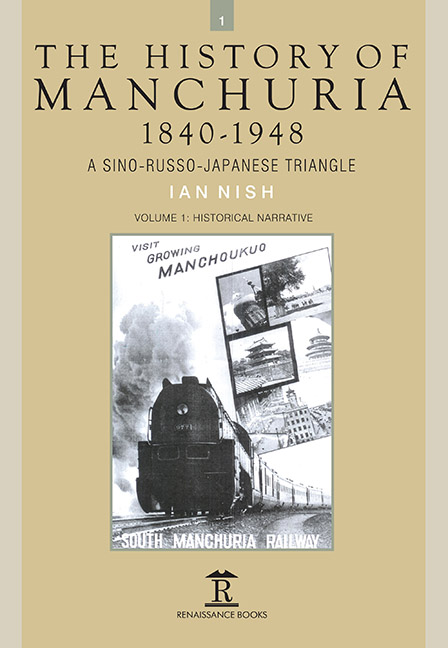Book contents
- Frontmatter
- Dedication
- Contents
- Preface
- Acknowledgements
- Name Conventions
- List of Abbreviations
- List of Maps
- Chapter One Manchuria and Russian Ambition, 1840s–1890s
- Chapter Two Sino-Japanese War and After, 1894–1900
- Chapter Three Prelude to the Russo-Japanese War, 1900–1905
- Chapter Four Railways, Reforms and Revolutions, 1906–1914
- Chapter Five Wartime Turmoil in Manchuria, 1915–1922
- Chapter Six Chang Tso-Lin’s Manchuria, 1922–28
- Chapter Seven Chinese Nationalism and Foreign Railways, 1929–1931
- Chapter Eight Lytton Commission in Manchuria, 1931–1932
- Chapter Nine Manchukuo: From Republic to Empire, 1933–1937
- Chapter Ten A Decade of Wars, 1938–1948
- Epilogue
- Map
- Select Bibliography
- Index
- Volume 2: Select Primary Sources
- Miscellaneous Frontmatter
- Dedication
- Miscellaneous Frontmatter
- Chapter 1 1840–1894
- Chapter 2 1895–1899
- Chapter 3 1900–1905
- Chapter 4 1905–1914
- Chapter 5 1915–1922
- Chapter 6 1922–1928
- Chapter 7 1929–1931
- Chapter 8 1931–1932
- Chapter 9 1933–1937
- Chapter 10 1938–1948
- Apendix Appeal by the Chinese Government
Chapter Nine - Manchukuo: From Republic to Empire, 1933–1937
Published online by Cambridge University Press: 18 November 2023
- Frontmatter
- Dedication
- Contents
- Preface
- Acknowledgements
- Name Conventions
- List of Abbreviations
- List of Maps
- Chapter One Manchuria and Russian Ambition, 1840s–1890s
- Chapter Two Sino-Japanese War and After, 1894–1900
- Chapter Three Prelude to the Russo-Japanese War, 1900–1905
- Chapter Four Railways, Reforms and Revolutions, 1906–1914
- Chapter Five Wartime Turmoil in Manchuria, 1915–1922
- Chapter Six Chang Tso-Lin’s Manchuria, 1922–28
- Chapter Seven Chinese Nationalism and Foreign Railways, 1929–1931
- Chapter Eight Lytton Commission in Manchuria, 1931–1932
- Chapter Nine Manchukuo: From Republic to Empire, 1933–1937
- Chapter Ten A Decade of Wars, 1938–1948
- Epilogue
- Map
- Select Bibliography
- Index
- Volume 2: Select Primary Sources
- Miscellaneous Frontmatter
- Dedication
- Miscellaneous Frontmatter
- Chapter 1 1840–1894
- Chapter 2 1895–1899
- Chapter 3 1900–1905
- Chapter 4 1905–1914
- Chapter 5 1915–1922
- Chapter 6 1922–1928
- Chapter 7 1929–1931
- Chapter 8 1931–1932
- Chapter 9 1933–1937
- Chapter 10 1938–1948
- Apendix Appeal by the Chinese Government
Summary
ON 1 JULY 1937, the Japanese occupied the Marco Polo Bridge which gave them a strategic position of control over the old national capital of Peking. This inaugurated what Chiang Kai-shek was to call China’s Total War of Resistance to Japan. It brought to an end five years of uncertainty in which two themes were predominant in China’s thinking: domestic unification and resistance to Japan. The Kuomintang leadership had since 1928 given priority to the former and tried to bring about national unification under the control of Nanking. As we have seen in previous chapters, Chang Hsueh-liang had broadly accepted the concept of unification and Chiang Kai-shek had, for his part, exercised an attitude of calculating tolerance towards him since he required the cooperation of Chang’s armies in the north. The Young Marshal was sorely tempted by possibilities of independence for Manchuria and was being sedulously cultivated by Japanese to find out what could be devised. But this was the subject of rumour and speculation and nothing concrete materialized.
The question of resistance to Japan in Manchuria was, of course, related to the Kuomintang’s failure to achieve effective political unification and, indeed, its involvement in costly campaigns elsewhere in China. Chiang identified two broad categories of Chinese opinion:
Those that were decadent and passive wanted to live quietly under the Japanese and therefore advocated a policy of non-resistance. The militant radicals, on the other hand, urged a policy of immediate war by which they hoped to strengthen their own position within the country.
In the face of this, what policy was the Nationalist Government or, in the case of Chang Hsueh-liang, a provincial government, to take in order to resist Japan after the Mukden Incident of 18 September? Chiang recognized
… that modern warfare is scientific warfare, and that China’s scientific inventions and industrial skill were in their infancy and inferior to Japan’s.
In the circumstances of protracted civil war, there was no possibility of retaliating with the large feudal armies which were available. In the circumstances, Nanking tried ‘to make concessions to all factions in the hope of stopping all internal strife in order to unite against the foreign enemy’.
- Type
- Chapter
- Information
- The History of Manchuria, 1840-1948A Sino-Russo-Japanese Triangle, pp. 165 - 186Publisher: Amsterdam University PressPrint publication year: 2016

